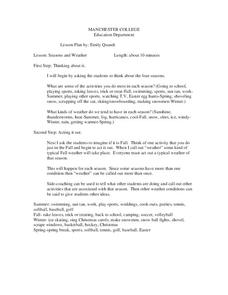Curated OER
Weather Fronts: Understanding the Movement of Air
Young scholars study various types of weather fronts and what happens to air at different temperatures. In this investigative lesson students draw various weather fronts and show the movement of the air then they observe demonstrations...
Teach Engineering
Stormy Skies
Young meteorologists examine the four main types of weather fronts and how they appear on a weather map. Participants learn about the difference between the types of weather fronts along with their distinguishing features. A...
Curated OER
Weather
Here is a comprehensive and colorful collection of slides to introduce 4th - 8th graders to all things weather-related. The factors that contribute to weather are defined, types of clouds and the related conditions are explained, air...
North Carolina Museum of Natural Sciences
Weather Watch Activity Guide: Groundhog Day
Exactly what do groundhogs know about weather? Not as much as your science students will after completing these lessons and activities that cover everything from the earth's rotation and the creation of shadows, to cloud...
Curated OER
Weather Watchers
Learners identify basic weather instruments and how they are used to record weather data. Students define several vocabulary terms as stated in instructional activity. Learners use basic instruments to record weather data in their area....
Virginia Department of Education
Weather Patterns and Seasonal Changes
Get your class outside to observe their surroundings with a lesson plan highlighting weather patterns and seasonal changes. First, learners take a weather walk to survey how the weather affects animals, people, plants, and trees during...
Curated OER
Weather Forecasting
Students examine cold, warm, and stationary fronts. They also examine the roles of relative humidity and the way air masses move. They are to create forecasts based on the information they collect. Tapes are shared with the class.
Scholastic
Study Jams! Air Masses & Fronts
Four types of air masses interact in the atmosphere above the US. The collision of these air masses forms a front, which, in turn, creates our weather. Concepts are explained by Sam and RJ, thus preventing a snowball fight. Your class...
Curated OER
Understanding Weather
A succinct set of slides covers the main points for your weather unit. From the factors that contribute to conditions, to fronts and extreme occurrences, to the different types of clouds, numerous facts are listed in bullets. The only...
Curated OER
Seasons and Weather
Learners, in an open forum with the teacher, discuss the four seasons and all the activities they do during each season. They tie in all the different types of weather that is experienced during each season. In conclusion, the students...
Curated OER
This Week's Weather
For this weather worksheet, students fill out a weather map each day of the week and give the lows, the highs, the warm fronts and the cold fronts. They answer six questions from their weather map work.
Curated OER
Warm and Cold Front Foldable
In this warm and cold front worksheet, students fill in a Venn diagram relating cold and warm fronts, they read and observe pictures of cold and warm fronts and they answer questions about warm and cold fronts.
Curated OER
Weather Map
Ninth graders utilize several different types of maps to forecast weather conditions specific areas of the country. Air masses, wind, cloud types, fronts, and the pH of the rain is explored in this lesson.
Curated OER
Weather Forecasting
Students study how to forecast the weather. In this weather forecasting lesson plan students read different meters and understand basic cloud formations in their relationship to weather.
Curated OER
Predicting Storms and Weather
Students use weather pattern worksheets to research how weather is predicted. In this weather prediction lesson plan, students predict the weather based on the wind, rain, currents, and other patterns.
Curated OER
Weather Patterns II
In this weather worksheet, middle schoolers use the diagram shown to explain what kinds of clouds form along the different types of air fronts. Then they describe what happens to the temperature when a particular front passes through....
Curated OER
Weather Forecasting
Students discover how to read a current weather map. In this weather forecasting lesson, students view weather maps from three consecutive days and observe how quickly weather moves and changes. Students review key terms associated with...
Curated OER
Regents High School Examination: Physical Setting Earth Science 2009
Junior geologists address 50 multiple choice questions and 35 short answer questions about the earth system. Plenty of visuals are included for interpretation: diagrams, graphs, maps, photographs, laboratory setups, weather symbols, and...
Curated OER
Clouds and Your Weather
Seventh graders identify clouds and the weather associated with them. They use informational articles and personal weather observations to learn about the relationships between weather fronts and clouds.
Curated OER
Learning Lesson: Analyzing a Weather Map
Learners use weather maps to locate warm and cold fronts. They discover the different types of weather associated with these fronts. They also observe the weather in their local area.
Curated OER
Weather Patterns
In this weather worksheet, students define an air mass and describe the different types of weather fronts. Students compare and contrast high pressure and low pressure systems. This worksheet has 4 short answer questions.
Curated OER
This Week's Weather
In this weather instructional activity, students record the weather for the week on individual US maps and include highs and lows, fronts and precipitation. They give all weather facts for the week and analyze the weather systems and...
Curated OER
Using the Synoptic Code for the Prediction of Weather
Students interpret the synoptic code. They construct a thermoscreen with an anemometer. Students identify different types of clouds and understand and read barometric pressure. Students predict weather pattern as they apply to fronts.
Curated OER
Cold Fronts And Warm Fronts
Students simulate the movement of cold and warm fronts as they listen to a story about the weather and Mr. Sun. They brainstorm the characteristics of each type of front then write about which front they would prefer if they were a...

























